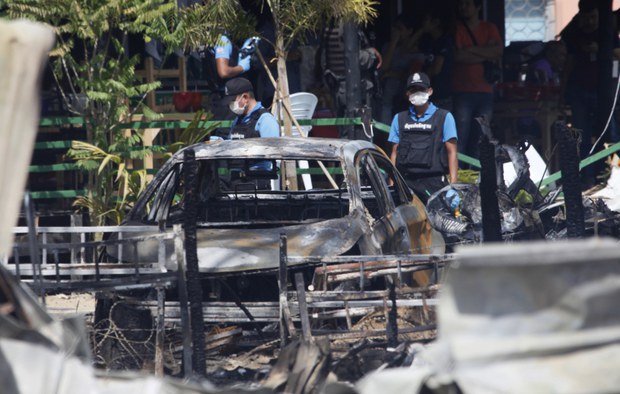Mahathir: Malaysia Will Carry on With Broker’s Role in Thai Peace Talks
2018.06.25
Kuala Lumpur
 Thai police officers examine the site of a car bomb attack in Pattani province, southern Thailand, Feb. 27, 2016.
Thai police officers examine the site of a car bomb attack in Pattani province, southern Thailand, Feb. 27, 2016.
Malaysia’s new government will carry on with the country’s role in brokering peace talks between the Thai government and Deep South rebels, Prime Minister Mahathir Mohamad indicated Monday.
Since 2015 Malaysia, under then-Prime Minister Najib Razak, facilitated several rounds of exploratory peace talks in Kuala Lumpur between the Thai military government and MARA Patani, a panel representing armed insurgent groups in Thailand’s Malay-speaking southern border region.
But after a new government took over in Malaysia last month, questions arose about whether Kuala Lumpur would continue acting as a peace broker.
During a press conference in Kuala Lumpur Monday night, when a BenarNews reporter asked Mahathir whether his administration would continue the previous government’s effort in brokering peace talks in southern Thailand, the prime minister replied, “Yes … yes, we are.”
After the press conference, the reporter asked Mahathir whether he would name a new negotiator to represent Malaysia as a facilitator of the talks.
“We will announce later,” Mahathir said.
Thai officials and other stakeholders in the peace initiative, meanwhile, have been waiting to hear from the Mahathir’s government about whether it planned to continue as a moderator of the talks and, if so, what changes would be made, if any, according to Don Pathan, a Thai-based security analyst who is an expert on the decades-old conflict in the Deep South.
“Many believe that Ahmad Zamzamin bin Hashim, the designated facilitator of the current official peace process, will be replaced following last month’s change of governments in Malaysia. Zamzamin was deemed too close to former Prime Minister Najib Razak,” Pathan wrote in a June 4 column for BenarNews.
Three years ago, officials representing the Thai junta and MARA Patani began discussions, with the Malaysian government serving as an overseer. Negotiations have failed to produce a so-called Safety Zone, or geographically limited ceasefire seen as a linchpin to prospects of future peace in the Deep South.
Nearly 7,000 people have been killed in violence since the insurgency in the predominantly Muslim region re-ignited in 2004.
Prior to the talks between MARA Patani and Thailand’s military government, Malaysia had facilitated efforts to settle the conflict. Kuala Lumpur brokered talks between the Thai government of Prime Minister Yingluck Shinawatra and Barisan Revolusi Nasional (BRN), the largest and most powerful of the southern insurgent groups, but those negotiations stalled in December 2013.
And, when Mahathir previously served as prime minister from 1981 to 2003, he and the Thai military gave impetus to a track of informal talks with rebels requested by Thailand’s monarchy, but the government of then-Prime Minister Thaksin Shinawatra “was kept out of the loop,” security analyst Zachary Abuza wrote in his 2016 book, “Forging Peace in Southeast Asia: Insurgencies, Peace Processes, and Reconciliation.”
In May, the latest talks came to a standstill because the rebel side felt insulted by Thai Prime Minister Prayuth Chan-o-cha for “jumping the gun” when he announced the likely site for a pilot Safety Zone in Cho I-rong, a district of Narathiwat province, according to Pathan. He said MARA Patani had felt humiliated because they were expecting a more formal launch for what they considered the breakthrough announcement.







